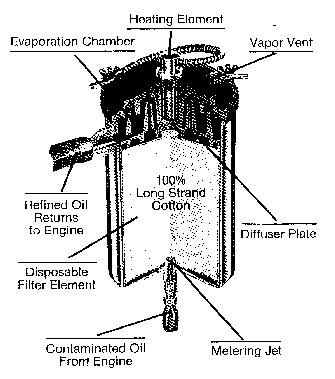|
|
|
The "by-pass" filter does not replace the full flow filter: it is installed in addition to and in parallel with it. About 10 percent of the total oil flow is diverted through the by-pass filter in a continuous cycle. The by-pass filter cleans the oil by removing particles larger than 2 microns (most engine damage is caused by particles smaller than 10 microns), as well as the detrimental water, fuel, and gases. This 10-percent oil flow is then returned to the oil pan. As a result, most of the contaminants in the oil are filtered out, and the oil will not need to be changed. Oil may need to be added, as necessary, to replace the amount lost during engine combustion. The by-pass filter not only eliminates the need for oil changes, it also should extend engine life as these contaminants are removed.
The Department of Defense, some truck fleets, and a few North Carolina state agencies are investigating the use of by-pass filters. In addition, the Society of Automotive Engineers conducted a 12-year study on the use of by-pass filters in school buses. The results from these various tests continue to be positive. It is important to note that these filters have been used in critical-service marine engines for several years, including those of the major oil companies.
Although the oil itself will no longer need to be changed, the filters, both the full-flow and the by-pass, will need to be changed periodically. A current test on one diesel fleet shows that the full-flow filter on each vehicle will need to be changed/cleaned only about every 40,000 miles, and the by-pass filter per vehicle should be changed/cleaned only about every 15,000 miles.
Based on analysis of the oil, these intervals have already been lengthened and will continue to be increased as appropriate.
To date, the average oil life for this test series has been 130,000 miles. The current results indicate that this fleet would reduce its oil consumption by 40 million quarts per year and realize a very good financial benefit from a payback of less than 6 months on its capital outlay. Although definitive estimates on the extended lives of engines have not been made, the current expectations are in the 1.5 million-mile range.
Typical By-Pass Filter
